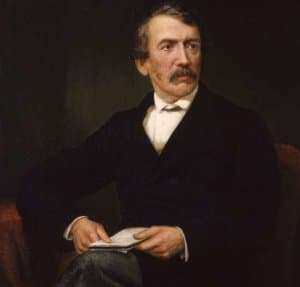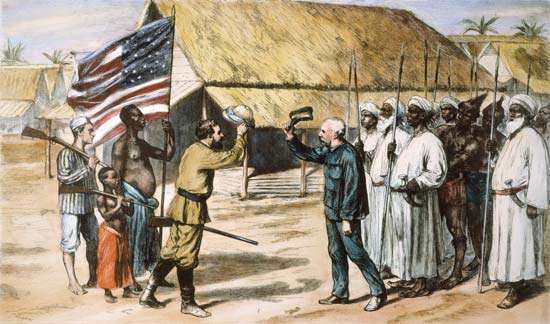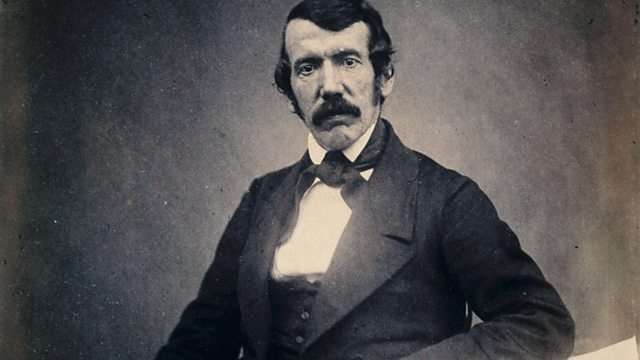Till the nineteenth century, Africa was called the ‘dark continent’; because there was no light of education and civilization. The European colonial powers penetrated into the interior of Africa with missionary zeal and trading purpose. They justified their imperialism by their civilizing mission.
One such outstanding person was Dr. David Livingstone of England (Scotland). Livingstone was a doctor, who was very courageous like Jim Corbett. Livingstone with his missionary zeal, discovered the interior of Africa, which was full of jungles infested with wild animals and poisonous insects like Tset-se fly. He made three expeditions to Africa and was successful. Africa came into lime light.
Livingstone was born on March 19, 1813 in Blantyre, South Lancashire, Scotland. He died on May 1, 1873 at the age of 60 in Chief Chitambo’s village, kingdom of Kazembe (now Northern Province, Zambia).

Livingstone was disliked slave trade from Africa. So, he wanted the destruction of slave trade through the influence of ‘legitimate trade’ and the spread of Christianity. So, he wanted to go to Southern Africa. He discovered the source of the river Nile. He had told a friend that the Nile sources are valuable only as a means of opening my mouth with power among men. His subsequent exploration of the central African watershed was the classic touch of geographical discovery and colonial penetration by the European powers.
Livingstone made three expeditions to Africa and discovered many geographical spots like the Victoria Falls, the course of the Zambezi River and other inaccessible areas of Africa. He was the first European to cross South-Central Africa. This achievement made him famous. He opened up Africa. He returned to Britain to get support for his ideas and publish a book on his travels. He became a leading explorer of his age. Livingstone believed that he had a spiritual calling for exploration mainly for searching trade routes and less for evangelical purpose.
Livingstone was an ardent explorer. His zeal was legendary. He said – “I am prepared to go anywhere, provided it be forward.”
Livingstone was awarded with the gold medal of the Royal Geographical Society of England and was made fellow of the society, with which he had a strong association for the rest of his life.
In his third expedition, Livingstone was lost in the jungles of Africa. He lost contact with the outside world for six years and was ill for the most of time. He wrote in one of his letters – I am terribly knocked up, but this is for your eye only. Doubtful, if I live to see you again.
So,Britishgovernment sent a Scottish journalist to find Livingstone out. Journalist was Henry Morton Stanley. He found Livingstone in the town of Ujjiji on the bank of Lake Tanganyika on November 10, 1871. Stanley greeted him thus – “Dr. Livingstone, I presume.” Livingstone responded – “Yes.” Then Mr. Stanley said – “Now I believe that my name is Mr. Stanley. Despite the urgings of Stanley, Livingstone refused to return to England until his mission is completed.

Alvyn Austin, an admirer of Livingstone, said – “During the anticolonial sixties (1960s) Livingstone was debunked. He made only one certified convert, who later backslided. He explored areas not already travelled by others. He freed few slaves. He treated his colleagues horribly. He travelled with Arab slave traders. His family was in shambles. To many, he embodied the white man’s burden mentality. Nonetheless, at a time when countries are being renamed and statues are being toppled, Livingstone has not fallen. Despite modern Africans animosity toward other Europeans, such as Cecil Rhodes, Livingstone endures as a heroic legend. Rhodesia has long since purged its name, but the cities of Livingstone (Zambia) and Livingstonia (Malawi) keep the explorer’s appellation with pride.
During his sojourn in Africa, Livingstone faced many dangers from wild animals and diseases especially malaria of which Africa is famous. On one occasion, he was attacked by a lion. His left hand was injured. Later on it was healed; but throughout his life he could not lift his left hand beyond his shoulder.
On another occasion, when a lion was running towards him to attack, he kept his gun at a perpendicular position between the gap of two rocks and he kept his hat on the top of the gun. The lion jumped over the hat (thinking it a man) and fell into a deep gorge behind it. The lion was outwitted by Livingstone and narrowly he escaped death.

Thus, Livingstone was very courageous and patient. Moreover, he was benevolent man. He was liked by the Africans very much so much so that when Livingstone died in Africa, the African tribals among whom he lived and worked, took out his heart from his body and buried it in African soil. The body was then sent to England to be buried at Westminster Abbey.
Such was Livingstone, a man by whom Africa got emerged from the blame of being called ‘Dark continent’ and received the light of education and civilization. Africa became a civilized continent after Livingstone.
Long live Livingstone for his altruism and bonhomie not only for the cause of England but for Africa.
(The views expressed are the writer’s own.)

Radhakanta Seth is an Income tax officer in Sambalpur. He is a freelance writer and his articles have been published in some Oriya dailies like Sambad, Samaj, Dharitri, and English dailies like The Telegraph and in a sociological journal ‘Folklore’ published from Kolkata.
He can be reached at [email protected]

